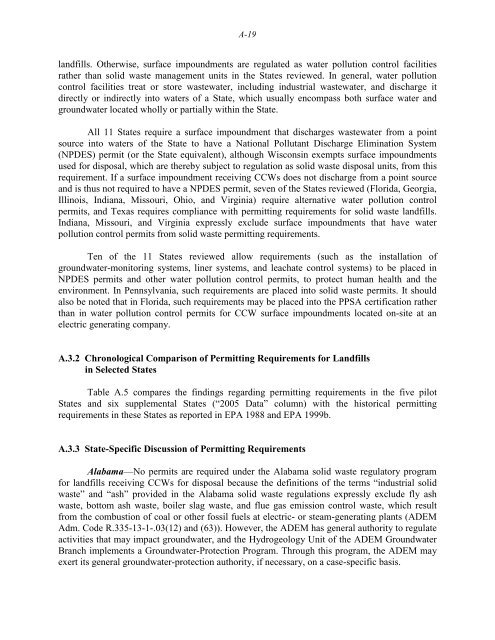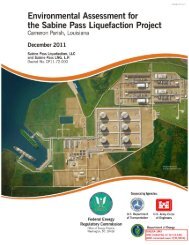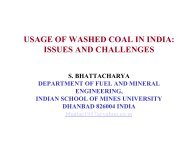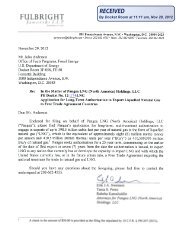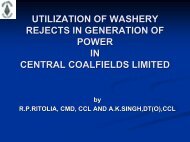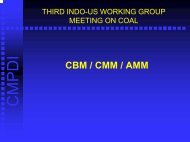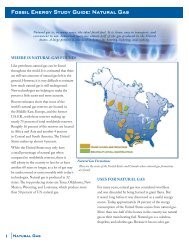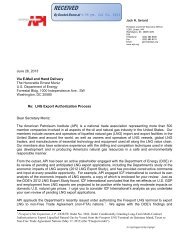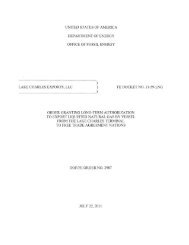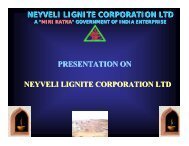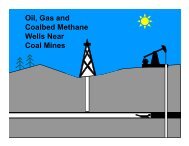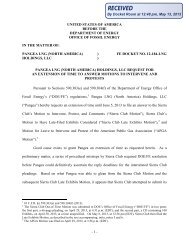Coal Combustion Waste Management at - DOE - Fossil Energy ...
Coal Combustion Waste Management at - DOE - Fossil Energy ...
Coal Combustion Waste Management at - DOE - Fossil Energy ...
You also want an ePaper? Increase the reach of your titles
YUMPU automatically turns print PDFs into web optimized ePapers that Google loves.
A-19<br />
landfills. Otherwise, surface impoundments are regul<strong>at</strong>ed as w<strong>at</strong>er pollution control facilities<br />
r<strong>at</strong>her than solid waste management units in the St<strong>at</strong>es reviewed. In general, w<strong>at</strong>er pollution<br />
control facilities tre<strong>at</strong> or store wastew<strong>at</strong>er, including industrial wastew<strong>at</strong>er, and discharge it<br />
directly or indirectly into w<strong>at</strong>ers of a St<strong>at</strong>e, which usually encompass both surface w<strong>at</strong>er and<br />
groundw<strong>at</strong>er loc<strong>at</strong>ed wholly or partially within the St<strong>at</strong>e.<br />
All 11 St<strong>at</strong>es require a surface impoundment th<strong>at</strong> discharges wastew<strong>at</strong>er from a point<br />
source into w<strong>at</strong>ers of the St<strong>at</strong>e to have a N<strong>at</strong>ional Pollutant Discharge Elimin<strong>at</strong>ion System<br />
(NPDES) permit (or the St<strong>at</strong>e equivalent), although Wisconsin exempts surface impoundments<br />
used for disposal, which are thereby subject to regul<strong>at</strong>ion as solid waste disposal units, from this<br />
requirement. If a surface impoundment receiving CCWs does not discharge from a point source<br />
and is thus not required to have a NPDES permit, seven of the St<strong>at</strong>es reviewed (Florida, Georgia,<br />
Illinois, Indiana, Missouri, Ohio, and Virginia) require altern<strong>at</strong>ive w<strong>at</strong>er pollution control<br />
permits, and Texas requires compliance with permitting requirements for solid waste landfills.<br />
Indiana, Missouri, and Virginia expressly exclude surface impoundments th<strong>at</strong> have w<strong>at</strong>er<br />
pollution control permits from solid waste permitting requirements.<br />
Ten of the 11 St<strong>at</strong>es reviewed allow requirements (such as the install<strong>at</strong>ion of<br />
groundw<strong>at</strong>er-monitoring systems, liner systems, and leach<strong>at</strong>e control systems) to be placed in<br />
NPDES permits and other w<strong>at</strong>er pollution control permits, to protect human health and the<br />
environment. In Pennsylvania, such requirements are placed into solid waste permits. It should<br />
also be noted th<strong>at</strong> in Florida, such requirements may be placed into the PPSA certific<strong>at</strong>ion r<strong>at</strong>her<br />
than in w<strong>at</strong>er pollution control permits for CCW surface impoundments loc<strong>at</strong>ed on-site <strong>at</strong> an<br />
electric gener<strong>at</strong>ing company.<br />
A.3.2 Chronological Comparison of Permitting Requirements for Landfills<br />
in Selected St<strong>at</strong>es<br />
Table A.5 compares the findings regarding permitting requirements in the five pilot<br />
St<strong>at</strong>es and six supplemental St<strong>at</strong>es (“2005 D<strong>at</strong>a” column) with the historical permitting<br />
requirements in these St<strong>at</strong>es as reported in EPA 1988 and EPA 1999b.<br />
A.3.3 St<strong>at</strong>e-Specific Discussion of Permitting Requirements<br />
Alabama—No permits are required under the Alabama solid waste regul<strong>at</strong>ory program<br />
for landfills receiving CCWs for disposal because the definitions of the terms “industrial solid<br />
waste” and “ash” provided in the Alabama solid waste regul<strong>at</strong>ions expressly exclude fly ash<br />
waste, bottom ash waste, boiler slag waste, and flue gas emission control waste, which result<br />
from the combustion of coal or other fossil fuels <strong>at</strong> electric- or steam-gener<strong>at</strong>ing plants (ADEM<br />
Adm. Code R.335-13-1-.03(12) and (63)). However, the ADEM has general authority to regul<strong>at</strong>e<br />
activities th<strong>at</strong> may impact groundw<strong>at</strong>er, and the Hydrogeology Unit of the ADEM Groundw<strong>at</strong>er<br />
Branch implements a Groundw<strong>at</strong>er-Protection Program. Through this program, the ADEM may<br />
exert its general groundw<strong>at</strong>er-protection authority, if necessary, on a case-specific basis.


